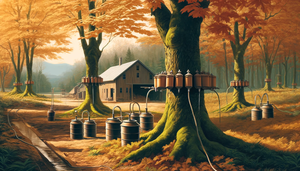Season Extension Techniques
Jul 14, 2024
Vermont's maple syrup is more than a sweet treat; it's a tradition steeped in history and artisanal craftsmanship. Extending the maple syrup production season is critical for producers aiming to maximize yield while maintaining the highest quality. Here, we delve into the innovative techniques used by Vermont producers to lengthen the season, ensuring a steady supply of this golden delight.
Understanding the Maple Syrup Season
The Traditional Season
Maple syrup production traditionally occurs in late winter and early spring when the days are warm and the nights are still cold. This temperature fluctuation is essential for sap flow, which is the lifeblood of maple syrup production.
Challenges of a Short Season
The natural maple syrup season is brief, typically four to six weeks. This short window can be significantly limited when adverse weather conditions disrupt the ideal temperature patterns. Producers must adapt to these challenges to ensure a successful harvest.
Techniques for Extending the Season
Advanced Tapping Methods
Modern tapping techniques have revolutionized the way sap is collected:
- High-Yield Taps: Utilizing specialized taps that minimize tree damage and maximize sap flow.
- Sanitary Tubing Systems: Ensuring clean, efficient sap collection by using tubing systems that reduce contamination and sap loss.
Vacuum Pump Systems
Implementing vacuum pump systems has become a standard practice:
- Consistent Sap Flow: Vacuum pumps maintain a steady sap flow even when natural pressure conditions fluctuate.
- Extended Collection Period: These systems can significantly prolong the tapping season by enhancing sap extraction efficiency.
Reverse Osmosis Technology
Reverse osmosis (RO) systems are a game-changer in maple syrup production:
- Efficient Processing: RO systems concentrate sap by removing excess water, reducing the energy needed for boiling.
- Extended Boiling Season: Producing more sap in less time allows producers to continue syrup production even when sap flow slows down.
Climate Control in Sugarhouses
Maintaining optimal conditions in the sugarhouse is crucial:
- Humidity Control: Using humidifiers and dehumidifiers to maintain ideal moisture levels.
- Temperature Regulation: Installing heating and cooling systems to stabilize temperatures, ensuring the sap remains in perfect condition for boiling.
Sustainability Practices
Sustainability is at the heart of Vermont maple syrup production:
- Selective Tapping: Only tapping mature trees and allowing time for recovery between seasons.
- Organic Farming Practices: Avoiding chemicals and pesticides to maintain the purity of the sap.
- Renewable Energy Use: Incorporating solar and wind energy to power sugarhouses, reducing the carbon footprint.
The Benefits of Season Extension
Consistent Supply
Extended production seasons ensure a more reliable supply of maple syrup, benefiting both producers and consumers. Wholesale retailers and restaurants can depend on a steadier stream of this sweet product, keeping customers satisfied year-round.
Enhanced Quality
Techniques like reverse osmosis and vacuum pumping extend the season and enhance the syrup's quality. These methods help produce a more concentrated, flavorful syrup, preserving the rich, traditional taste that Vermont is known for.
Economic Stability
Extending the maple syrup season for local producers translates to greater economic stability. More production time means more opportunities to sell and distribute syrup, supporting the local economy and preserving the heritage of maple syrup production in Vermont.
Frequently Asked Questions (FAQs)
Q: How long is the traditional maple syrup season?
A: The traditional season lasts about four to six weeks, from late winter to early spring.
Q: What role do vacuum pumps play in extending the season?
A: Vacuum pumps help maintain a steady flow of sap, even when natural conditions are not ideal, thereby extending the tapping period.
Q: Are the advanced techniques used by Vermont producers sustainable?
A: Yes, many producers use sustainable practices, including selective tapping, organic farming, and renewable energy sources.
Q: Does reverse osmosis affect the flavor of maple syrup?
A: Reverse osmosis enhances the syrup's flavor by concentrating the sap before boiling, resulting in a richer, more robust taste.
Q: Can small-scale producers use these techniques?
A: While some techniques require investment, many small-scale producers can implement these methods to extend their production season.
Vermont's maple syrup producers have embraced innovative techniques to extend the production season, ensuring a steady supply of this cherished sweetener. Through advanced tapping methods, vacuum pump systems, reverse osmosis technology and sustainable practices, they preserve the quality and tradition of Vermont maple syrup. This dedication to excellence ensures that maple syrup lovers can enjoy the rich, wholesome sweetness of Vermont's finest year-round.


